Ditapis dengan
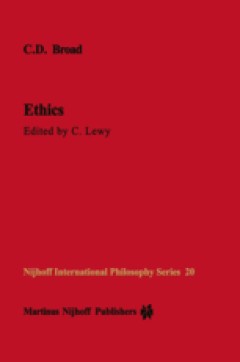
Ethics
This volume contains C. D. Broad's Cambridge lectures on Ethics. Broad gave a course of lectures on the subject, intended primarily for Part I of the Moral Sciences Tripos, every academic year from 1933 - 34 up to and in cluding 1952 - 53 (except that he did not lecture on Ethics in 1935 - 36). The course however was frequently revised, and the present version is es sentially that which he …
- Edisi
- -
- ISBN/ISSN
- 902473088
- Deskripsi Fisik
- viii + 319 pg.; 24,5 cm.
- Judul Seri
- -
- No. Panggil
- 170 BRO e
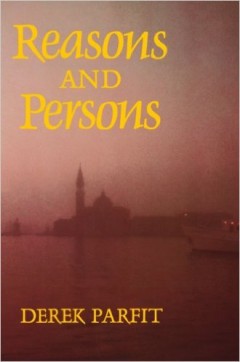
Reason ad Person
Challenging, with several powerful arguments, some of our deepest beliefs about rationality, morality, and personal identity, Derek Parfit claims that we have a false view about our own nature. It is often rational to act against our own best interests, he argues, and most of us have moral views that are self-defeating. We often act wrongly, although we know there will be no one with serious gr…
- Edisi
- -
- ISBN/ISSN
- 0198246153
- Deskripsi Fisik
- xv + 543 pg.; 20 cm.
- Judul Seri
- -
- No. Panggil
- 170 PAR r

Rational Man: A Modern Interpretation of Aristotelian Ethics
Forty years after its original publication, Liberty Fund brings back to print Henry Veatch’s path-breaking popular presentation of virtue ethics. This modern interpretation of Aristotelian ethics is a natural for undergraduate philosophy courses. It is also an engaging work for the expert and the beginner alike, offering a middle ground between existential and analytic ethics. Veatch argue…
- Edisi
- -
- ISBN/ISSN
- 0253200717
- Deskripsi Fisik
- 226 pg.; 20 cm.
- Judul Seri
- -
- No. Panggil
- 185 VEA r
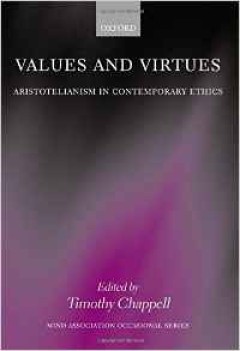
Values and virtues: Aristotelianism in Contemporary Ethics
After 25 centuries, Aristotle's influence on our society's moral thinking remains profound and he continues to be a very important contributor to contemporary debates in philosophical ethics. This collection showcases some of the best new writing on the Aristotelian notion of virtue of character, which remains central to much of the most interesting work in ethical theory.
- Edisi
- -
- ISBN/ISSN
- 0199291454
- Deskripsi Fisik
- ix + 299 pg.; 27 cm.
- Judul Seri
- -
- No. Panggil
- 171.3 VAL v
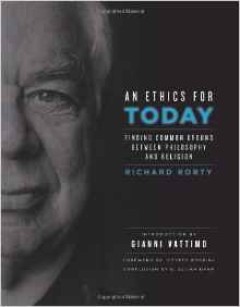
An Ethics for Today: Finding Common Ground Between Philosophy and Religion
Richard Rorty is famous, maybe even infamous, for his philosophical nonchalance. His groundbreaking work not only rejects all theories of truth but also dismisses modern epistemology and its preoccupation with knowledge and representation. At the same time, the celebrated pragmatist believed there could be no universally valid answers to moral questions, which led him to a complex view of relig…
- Edisi
- -
- ISBN/ISSN
- 9780231150569
- Deskripsi Fisik
- xxii + 75 pg.; 27 cm.
- Judul Seri
- -
- No. Panggil
- 170 ROR e
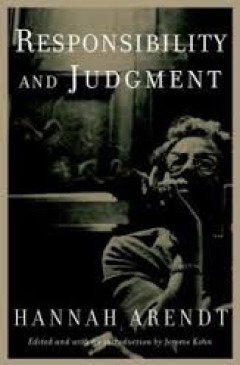
Responsibility and Judgement
Responsibility and Judgment gathers together unpublished writings from the last decade of Arendt’s life, where she addresses fundamental questions and concerns about the nature of evil and the making of moral choices. At the heart of the book is a profound ethical investigation, “Some Questions of Moral Philosophy,” in which Arendt confronts the inadequacy of traditional moral “truths�…
- Edisi
- -
- ISBN/ISSN
- 0805242120
- Deskripsi Fisik
- xxxvii + 295 pg.; 21,5 cm.
- Judul Seri
- -
- No. Panggil
- 172 ARE r
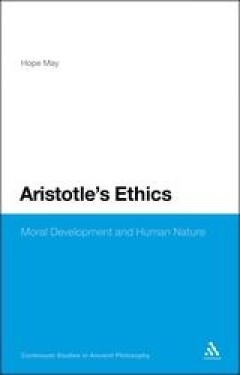
Aristotle's Ethics: Moral Development and Human Nature
Aristotle's Nicomachean Ethics is devoted to the topic of human happiness. Yet, although Aristotle's conception of happiness is central to his whole philosophical project, there is much controversy surrounding it. Hope May offers a new interpretation of Aristotle's account of happiness - one which incorporates Aristotle's views about the biological development of human beings. May argues that…
- Edisi
- -
- ISBN/ISSN
- 9780826491107
- Deskripsi Fisik
- xiv + 189 pg.; 26 cm.
- Judul Seri
- -
- No. Panggil
- 171.3 MAY a
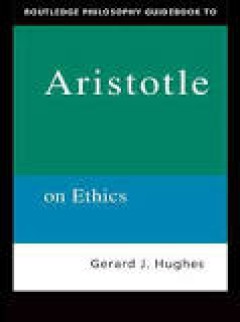
Routledge Philosophy Guidebook to Aristotle on Ethics
Aristotle's Nicomachean Ethics is a central text in the history of western philosophy. It continues to be at the heart of contemporary moral theory and essential to understanding the development of ethical thought in the West. This volume offers students an accessible guide to Aristotle's ethics. It explains the key elements in Aristotle's terminology and highlights the controversy regarding th…
- Edisi
- -
- ISBN/ISSN
- 0203181573
- Deskripsi Fisik
- x + 238 pg.; 24 cm.
- Judul Seri
- -
- No. Panggil
- 171.3 HUG r
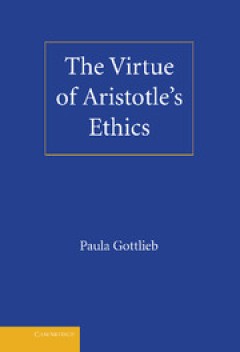
The Virtue of Aristotle's Ethics
While Aristotle's account of the happy life continues to receive attention, many of his claims about virtue of character seem so puzzling that modern philosophers have often discarded them, or have reworked them to fit more familiar theories that do not make virtue of character central. In this book, Paula Gottlieb takes a fresh look at Aristotle's claims, particularly the much-maligned doctrin…
- Edisi
- -
- ISBN/ISSN
- 9780511540035
- Deskripsi Fisik
- xix + 241 pg.; 27,5 cm.
- Judul Seri
- -
- No. Panggil
- 171.3 GOT v

Universalism vs Communitarianism: Contemporary Debates in Ethics
Universalism vs. Communitarianism focuses on the question, raised by recent work in normative philosophy, of whether ethical norms are best derived and justified on the basis of universal or communitarian standards. It is unique in representing both Continental and American points of view and both the older and a younger generation of scholars. The essays introduce the key issues involved in un…
- Edisi
- -
- ISBN/ISSN
- 0262680637
- Deskripsi Fisik
- 297 pg.; 23 cm.
- Judul Seri
- -
- No. Panggil
- 170 UNI u
 Karya Umum
Karya Umum  Filsafat
Filsafat  Agama
Agama  Ilmu-ilmu Sosial
Ilmu-ilmu Sosial  Bahasa
Bahasa  Ilmu-ilmu Murni
Ilmu-ilmu Murni  Ilmu-ilmu Terapan
Ilmu-ilmu Terapan  Kesenian, Hiburan, dan Olahraga
Kesenian, Hiburan, dan Olahraga  Kesusastraan
Kesusastraan  Geografi dan Sejarah
Geografi dan Sejarah